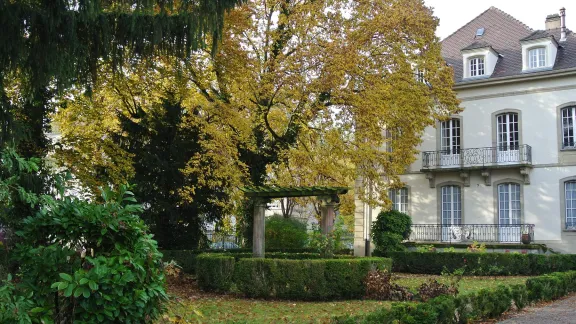The Institute for Ecumenical Research in Strasbourg invites participants for an online course exploring major developments in relationships between the churches over the past sixty years

The Institute for Ecumenical Research in Strasbourg. Photo: Denis Leypold
Strasbourg Institute offers online course on ecumenism
(LWI) - Training a new generation of ecumenists and facilitating dialogue about ecumenical theology and practice in different parts of the global Lutheran communion. Those are the goals of an online study course organized by the Institute for Ecumenical Research in Strasbourg from 23 to 27 October 2023.
The English language course will explore major ecumenical developments of the past sixty years, particularly regarding relations between Lutherans and Roman Catholics, Mennonites, Orthodox, Anglicans and Pentecostals. Participants will be asked to report on relations between the churches in their respective countries, discussing challenges and developing tools to promote “a rapprochement between churches” in the different contexts.
Organizers note that the course will also offer an experience of “intense transcultural dialogue” for a maximum of 20 participants, with the aim of developing ties and contributing to communion building among the member churches of the Lutheran World Federation (LWF).
The ecumenical landscape is shifting [and] we are harvesting the fruits of years of dialogue.
– Prof. Dr Dirk Lange, LWF Assistant General Secretary for Ecumenical Relations and acting director of the Strasbourg Institute
Participants will receive five lectures in video and written format to study in preparation for the training and they will also receive a certificate of participation on completion of the course. The cost is 100 Euros for the whole week and participants are required to have the endorsement of their church leadership. Applications can be submitted online here [LINK] and the deadline is 15 August 2023.
LWF’s Assistant General Secretary for Ecumenical Relations and acting director of the Strasbourg Institute Prof. Dr Dirk Lange encouraged participation from around the global communion. He noted that “the ecumenical landscape is shifting, we are harvesting the fruits of years of dialogue - dialogue that is ongoing and intense and, at the same time, we recognize that ecumenism takes on different dimensions in different parts of our globe.”
Reflecting on the objectives of the course, Lange added: “Bringing students together, learning from one another, discovering varying approaches to ecumenism, strengthening our commitment to the deep-down unity of the church, and together responding to the urgent pastoral and humanitarian needs of our world - all these aspects will move us further along the journey to communion.”


